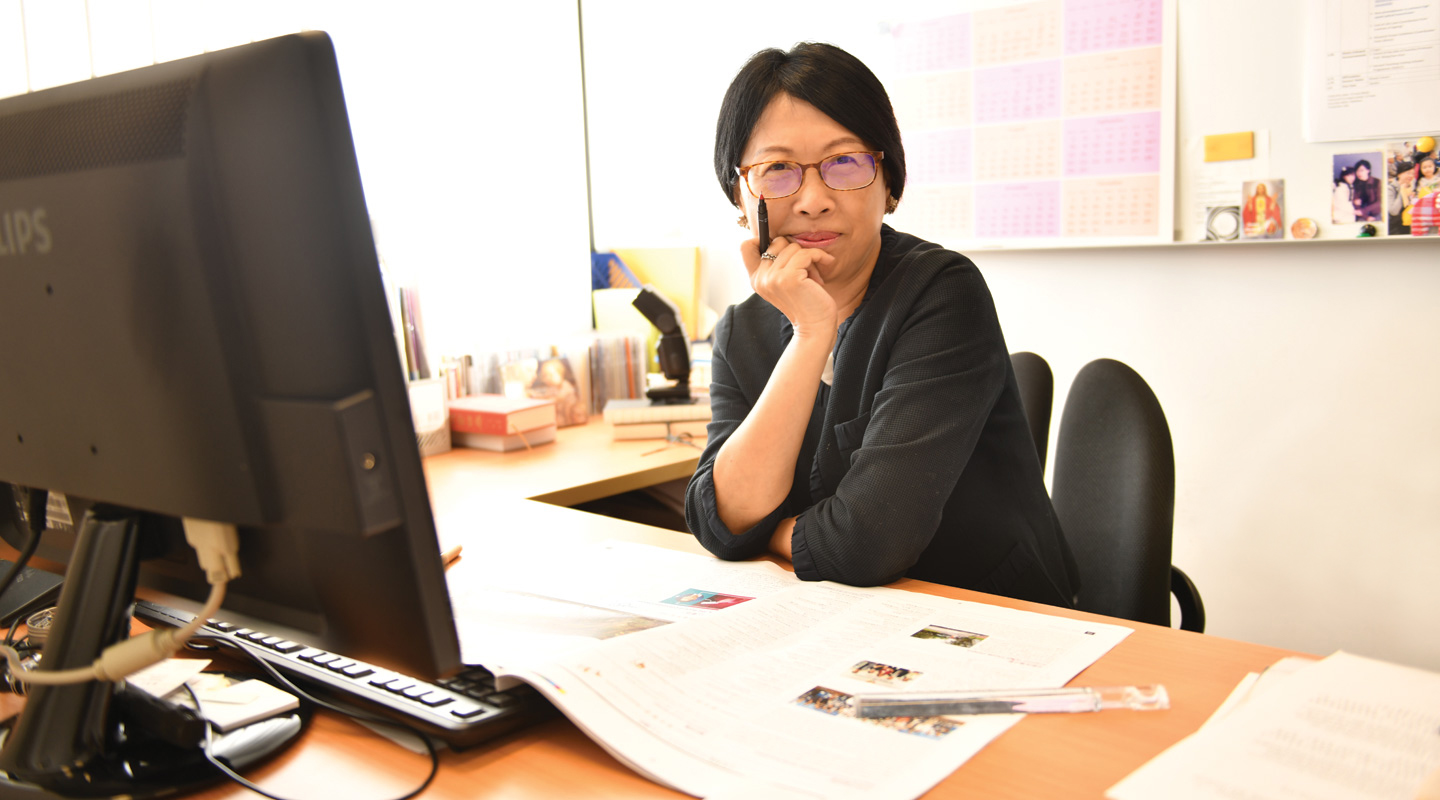A Life in Letters: Sandra Lo

Sandra Lo
- Chief Editor of Information Services Office
A language lover since childhood, Ms. Sandra Lo has carried out a lifelong romance with letters: first as a Chinese language teacher, then as a news translator, and later as the only Chinese language officer in a higher education institution. Her 12 years with the Information Services Office as a gatekeeper for all writings and publications continues this labour of love. In the eyes of her colleagues, she is a scrupulous editor-in-chief and a beloved and revered teacher.
How were you initiated into the world of letters?
Despite modest means, my mother insisted on sending me to kindergarten, which was something of a privilege at that time. My neighbourhood kindergarten did not have walls between classrooms but only partitions. The goings-on of the neighbouring class were within earshot and sight. That’s how I was tutored in a higher grade. At night, I read the textbooks of my sister who’s three grades higher. My vocabulary grew fast and by primary one, when my classmates were still describing spring with ‘spring’, I was already using metaphors like ‘nature awakening’ and ‘new blooms everywhere’.
Seems like there were parental influences as well?
My father worked for The Standard and South China Morning Post as a proofreader in the 1950s and 60s. When asked how a word should be pronounced, he wouldn’t just say it for us but would approach it phonetically. My mother didn’t receive any formal education. Her literacy came from reading the Bible. She would repeatedly ask me about new words until she had learned them by heart. She was always vivid and precise in her expressions. Because of that, linguistic felicity was very much upheld by me and my three siblings, whether in daily conversations or in arguments.

You are meticulous between the lines on a page and beyond. Were you born that way?
Maybe I’m a sensitive person. I could see many meanings behind a single word or phrase. So I pick up the ambiguities in a text easily. My years of editing experience would immediately point me to where most problems might lie. My husband always said I have a knack for lying in wait and pouncing on people at the first sign of a mistake. I would beg his pardon, and blame it on professional reflex. Of course, like many things in life, a mistake can be tolerated if it’s not a matter of life and death.
Can you share your deepest insight about writing?
The best kind of writing always carries that perfect blend of sense and sensibility. I am of the sentimental type, but life has taught me that sentimentality does us no good in both writing and life. The older I grow, the more I begin to appreciate and admire writings that touch the heart and pique the brain. I particularly like the Hong Kong columnist To To whose prose on food, music, literature, film and art demonstrates how laser-sharp analysis can bring out the beauty of the familiar things around us.
Some say one should do what one loves; others say work kills joy. What’s your take on this?
We are no strangers to stories of people sacrificing their interests to make ends meet. But interests can be cultivated outside work, and work can be enjoyable, too. We do not need to fall in love with our work, but we need to be responsible. If you’ve come to the point where you find it hard to stomach anymore, it’s time to quit if you do not need the income to survive. This will do good to the workplace as well as your mental health. I am grateful that all the jobs I have done so far align with my interests.
How do you view the state of language today?
Language mirrors our thoughts and attitudes. Modern life proceeds at such a breakneck speed, leaving very little time for the belles lettres. Though far from being erudite in any sense, I am considered old-school by many. Now or in the past, I love to keep things simple and spot on—there is no point in rambling on hysterically.
Any word of advice to the young writers?
What a flattering question. Well, respect words. Every word or phrase counts. Don’t just lump things together thoughtlessly. With Chinese, it helps to read more classical texts. Good to start with Guwen Guanzhi.
We know you have very wide interests. Mind sharing one or two with us?
I have joined the chorus for more than half a century. I was eight when a church tutor taught me and my sister to sing in a duet. Our two lines seemed to twine into a shimmering harmony. I was profoundly moved. What I practise is Western bel canto, but I am also fond of all genres of Chinese opera. Cooking is another passion of mine. You can follow the recipe to the letter, or you can improvise. To prepare food in the still of the night is therapeutic.
Was your daughter’s pursuit of fashion photography influenced by you?
As parents, we should never over- or underestimate our influence on children. Don’t be too hung up on ‘setting a good example’. But take care not to give bad influence to them, either. My daughter discovered her own ability and interest, and is following a unique path. I am happy for and proud of her.
Any plans for life after retirement?
To take stock, and part with the nonessentials. To follow my heart, and do good.
Amy L.
This article was originally published in No. 540, Newsletter in Jun 2019.

